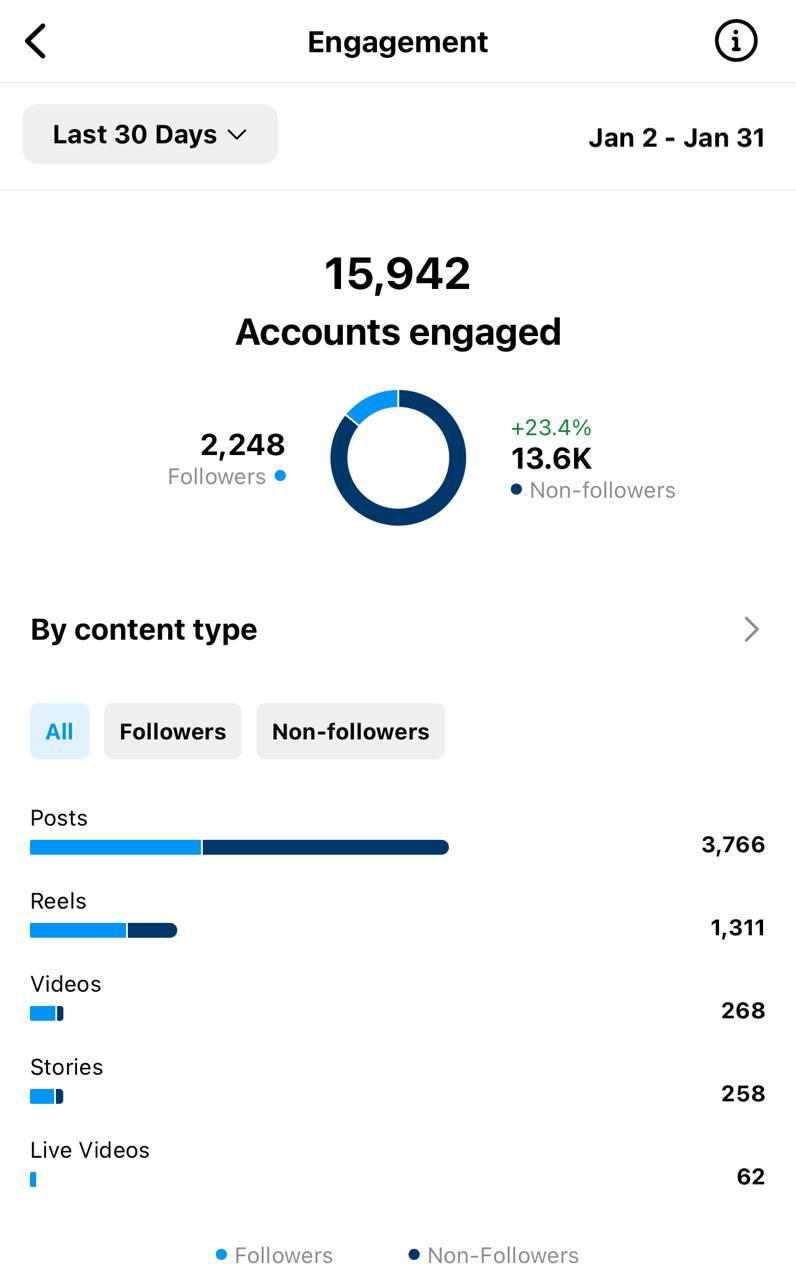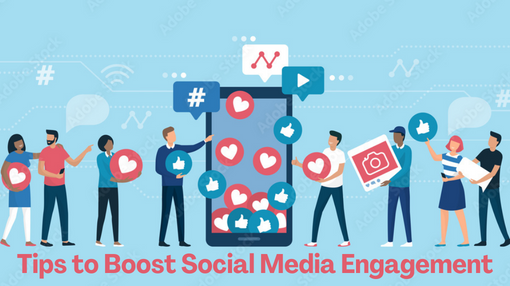Social media engagement notably influences small businesses by shaping brand awareness and customer loyalty. This resource offers guidance on enhancing your social media engagement strategy to ensure a positive impact.
What is social media engagement?
Social media engagement refers to the level of interaction, involvement, and participation that users have with content on social media platforms. It encompasses various actions taken by users, such as likes, comments, shares, retweets, mentions, direct messages, and clicks. Essentially, it’s the measure of how actively users engage with the content and accounts they encounter on social media.
Engagement is a key metric for assessing the effectiveness of social media marketing efforts because it indicates how well content resonates with the audience and how successful a brand is at fostering meaningful connections with its followers. Higher engagement typically correlates with increased brand awareness, improved reach, and stronger relationships with customers.
Why social media engagement is so important ?
Social media engagement represents the heart of any effective digital marketing strategy, serving as a direct line of communication between a brand and its audience. By actively participating in discussions, responding to comments, and sharing relevant content, a business can enhance its visibility and build a loyal following on social media platforms.
High social media engagement rates not only bolster brand awareness but also contribute significantly to customer satisfaction and retention. Moreover, these interactions provide valuable insights into consumer preferences, enabling companies to tailor their offerings and messaging to better meet user expectations. Ultimately, fostering robust social media engagement is essential for nurturing a vibrant, interactive community that supports long-term business growth and success.
Social media engagement is crucial for several reasons, and its importance spans personal and professional lives:
Importance of social media engagement for individuals:
Connection and Community:
Social media platforms connect you with friends, family, and like-minded individuals, fostering a sense of belonging and community. Engagement allows you to actively participate in these connections, share your thoughts and experiences, and receive support or feedback.
Self-expression and Identity:
Social media provides a platform to express yourself creatively, share your interests and passions, and build your online identity. Engagement allows you to interact with others who share your interests and build meaningful connections based on shared experiences.
Information and Awareness:
Social media keeps you informed about current events, trending topics, and diverse perspectives. Engagement exposes you to different viewpoints, fosters discussions, and helps you stay connected to the world around you.
Importance of social media engagement for businesses and organizations:
Brand Building and Awareness:
Social media allows businesses to showcase their brand, values, and offerings to a large audience. Engagement helps build brand awareness, attract potential customers, and establish a positive brand image.
Customer Relationships and Loyalty:
Social media enables two-way communication with customers, allowing businesses to address concerns, provide support, and build relationships. Engagement fosters customer loyalty, encourages positive word-of-mouth marketing, and increases sales.
Market Research and Insights:
Social media listening and engagement analysis provide valuable insights into customer preferences, needs, and pain points. These insights can inform product development, marketing strategies, and overall business decisions.
Content Optimization and Reach:
Engagement metrics help businesses understand what content resonates with their audience and what doesn’t. This allows them to optimize their content strategy, improve reach, and drive desired outcomes.
social media engagement is like the lifeblood of online interactions. It fosters connections, builds communities, spreads information, and ultimately drives success, both personally and professionally.
How to boost social media engagement ?
Boosting social media engagement is an essential strategy for creating a dynamic and interactive online presence. Firstly, it’s important to understand your audience and tailor content that resonates with their interests and needs. Use analytics tools to track engagement and determine the best times to post, ensuring content reaches the maximum number of followers.
Regularly posting high-quality, relevant content is key; consistency keeps your audience engaged and looking forward to your next post. Incorporating a mix of media types, such as images, videos, and infographics, can make your content more appealing.
Tips on how to boost social media engagement & how to connect with the audience?
Boosting social media engagement and connecting with your audience are essential for building a strong online presence and driving business growth. Here are some tips to help you achieve both:
Know Your Audience
Understand your target audience’s demographics, interests, preferences, and pain points. Tailor your content and messaging to resonate with their needs and values.
Create Compelling Content
Produce high-quality, visually appealing content that educates, entertains, or inspires your audience. Experiment with different formats such as videos, images, infographics, and stories to keep your feed diverse and engaging.
Use Captivating Captions
Craft compelling captions that accompany your posts to grab attention, spark curiosity, and encourage interaction. Ask questions, share stories, or include call-to-action phrases to prompt engagement from your audience.
Encourage Interaction
Actively encourage your followers to engage with your content by asking questions, soliciting feedback, and inviting them to share their thoughts and experiences. Respond promptly and authentically to comments and messages to foster meaningful conversations.
Leverage Hashtags and Trends
Utilize relevant hashtags and participate in trending topics and challenges to increase the visibility of your content and attract new followers. Research popular hashtags in your niche and incorporate them strategically into your posts.
Host Live Events and Q&A Sessions
Engage directly with your audience through live video streams, webinars, or Q&A sessions. These interactive formats allow you to connect with your audience in real-time, answer their questions, and address their concerns.
Share User-Generated Content
Encourage your followers to create and share content related to your brand or products. Repost user-generated content to showcase social proof, build community, and strengthen relationships with your audience.
Offer Exclusive Deals and Discounts
Reward your followers with exclusive deals, discounts, or promotions for engaging with your content or participating in contests and challenges. Create a sense of exclusivity and value to incentivize action.
Collaborate with Influencers and Partners
Partner with influencers, brand advocates, or complementary businesses to expand your reach and tap into their engaged audience. Collaborate on co-branded content, giveaways, or sponsored posts to generate buzz and drive engagement.
Measure and Analyze Performance
Track key engagement metrics such as likes, comments, shares, and click-through rates to evaluate the effectiveness of your social media efforts. Use analytics tools to identify trends, understand audience behaviour, and optimize your strategy accordingly.
By implementing these tips, you can boost social media engagement, foster connections with your audience, and create a thriving community around your brand. Remember to stay authentic, consistent, and responsive to cultivate meaningful relationships and drive long-term success on social media.
Top Social Media Platforms for Business Marketing
The top platforms for business marketing can vary depending on factors like the target audience, industry, and marketing goals. However, some platforms consistently prove to be effective for many businesses:
Google Ads for Business
Google Ads allows businesses to place ads in Google’s search results, display network, YouTube, and other platforms. It’s powerful for reaching people actively searching for products or services.
Facebook Ads for Businesses
With billions of users, Facebook offers precise targeting options based on demographics, interests, and behaviors. It’s suitable for businesses aiming to build brand awareness, generate leads, or drive website traffic.
Instagram Advertising for Business
Owned by Facebook, Instagram is particularly popular among younger demographics. It’s visual-centric, making it ideal for businesses with visually appealing products or services.
LinkedIn Marketing for Business
LinkedIn is a professional networking platform, making it valuable for B2B marketing, recruitment, and thought leadership. It’s effective for reaching decision-makers and professionals in specific industries.
Twitter For Awareness & Brand Marketing
Twitter is known for its real-time conversations and trending topics. It’s suitable for businesses aiming to engage with their audience, provide customer support, or share timely updates.
YouTube Marketing and Branding
Video content continues to rise in popularity, and YouTube is the go-to platform for video marketing. It’s effective for businesses that can create engaging video content to educate, entertain, or showcase their products/services.
Pinterest for Businesses
Pinterest is a visual discovery platform where users find inspiration for various topics, from fashion to home decor. It’s beneficial for businesses in industries such as fashion, food, and DIY.
Email Marketing
While not a social media platform, email marketing remains a powerful tool for nurturing leads, retaining customers, and driving sales. Platforms like Mailchimp, Constant Contact, and HubSpot offer robust email marketing solutions.
Content Marketing/Blogging
Content marketing involves creating and distributing valuable, relevant content to attract and retain a target audience. Blogging, in particular, is an effective way to establish authority, drive organic traffic, and engage with your audience.
SEO (Search Engine Optimization)
Again, not a platform, but optimizing your website for search engines is crucial for long-term visibility and organic traffic. Tools like Google Analytics, SEMrush, and Moz can help businesses improve their SEO efforts.
These platforms offer diverse opportunities for businesses to connect with their target audience, increase brand visibility, and drive conversions. Choosing the right platforms depends on factors like business goals, target audience demographics, and available resources.
How you can measure your social media growth?
Measuring your social media presence using metrics involves tracking various key performance indicators (KPIs) to assess the effectiveness of your social media efforts. Here’s how you can measure your social media presence with the help of metrics:
Follower Growth:
Monitor the growth of your followers on each social media platform over time. A steady increase in followers indicates a growing audience interested in your content and brand.
Reach and Impressions:
Track the reach and impressions of your posts to understand how many people are seeing your content. Reach measures the unique number of users who see your content, while impressions represent the total number of times your content is displayed.
Engagement Metrics:
Monitor engagement metrics such as likes, comments, shares, retweets, and reactions on your posts. Higher engagement indicates that your content is resonating with your audience and encouraging interaction.
Click-through Rate (CTR):
Measure the percentage of users who click on links or call-to-action buttons in your social media posts. A higher CTR indicates that your content is compelling enough to drive traffic to your website or landing pages.
Conversion Rate:
Track the percentage of social media users who complete a desired action, such as making a purchase, signing up for a newsletter, or downloading a resource after clicking on a post. Conversion rate helps assess the effectiveness of your social media marketing efforts in driving tangible business outcomes.
Sentiment Analysis:
Monitor the sentiment (positive, negative, or neutral) of comments, mentions, and reviews related to your brand on social media. Positive sentiment indicates a favorable perception of your brand, while negative sentiment may signal areas for improvement or issues to address.
Social Media Referral Traffic:
Analyze the amount of traffic coming to your website from social media channels. Tracking referral traffic helps identify which platforms are driving the most traffic and which content is most effective at driving clicks.
Share of Voice:
Measure your brand’s share of voice compared to competitors by tracking mentions, engagement, and overall visibility on social media platforms. A higher share of voice indicates a stronger presence and greater influence within your industry or niche.
Brand Mentions:
Monitor the frequency and context of brand mentions across social media platforms. Tracking brand mentions helps gauge brand awareness, sentiment, and conversations surrounding your brand.
Return on Investment (ROI):
Calculate the ROI of your social media efforts by comparing the costs (e.g., advertising spend, content creation expenses) with the benefits (e.g., increased sales, leads generated, customer acquisition). ROI analysis helps determine the overall effectiveness and profitability of your social media marketing initiatives.
By regularly monitoring and analyzing these metrics, you can gain valuable insights into your social media presence, audience engagement, and the effectiveness of your marketing strategies. Use these insights to refine your approach, optimize performance, and achieve your business objectives on social media.
5 social media engagement strategies
Here are five effective social media engagement strategies to boost interaction and connection with your audience:
Utilize Social Plugins:
Incorporate social plugins such as share buttons, follow buttons, and embedded posts into your website to encourage visitors to interact with your content and share it with their social networks. These plugins facilitate easy sharing and amplification of your content, increasing its reach and engagement.
Foster Conversations:
Actively engage in conversations with your audience on social media platforms. Respond to comments, messages, and mentions promptly and authentically. Encourage discussions by asking questions, seeking feedback, and inviting opinions. By fostering two-way communication, you can build stronger relationships with your audience and increase engagement.
Leverage Live Video:
Embrace live video streaming on platforms like Facebook Live, Instagram Live, or YouTube Live to connect with your audience in real-time. Host live Q&A sessions, behind-the-scenes tours, product demonstrations, or special events to provide valuable and engaging content. Live videos often generate higher levels of engagement as they offer an interactive and authentic experience for viewers.
Utilize Social Media as a Customer Service Tool:
Use social media platforms as a customer service tool to address inquiries, resolve issues, and provide support to your customers. Monitor social media channels for mentions, questions, and feedback related to your brand, and respond promptly and professionally. Providing excellent customer service on social media can enhance customer satisfaction, loyalty, and brand reputation.
Develop Brand Personas:
Create and maintain distinct brand personas that resonate with your target audience across social media platforms. Tailor your content, tone, and messaging to align with each persona’s preferences, interests, and behaviours. By humanizing your brand and communicating in a relatable and authentic manner, you can attract and engage your audience more effectively.
Implementing these social media engagement strategies can help you build a strong online presence, foster meaningful connections with your audience, and drive positive interactions that contribute to your business’s success.
By incorporating these easy-to-implement strategies into your social media marketing efforts, you can boost engagement, strengthen relationships with your audience, and achieve your business goals in 2024 and beyond.



